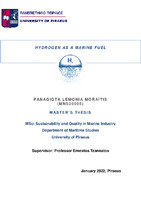Hydrogen as a marine fuel

Master Thesis
Συγγραφέας
Μωραΐτη, Παναγιώτα Λεμονιά
Moraiti, Panagiota Lemonia
Ημερομηνία
2022-01Επιβλέπων
Τζαννάτος, ΕρνέστοςTzannatos, Ernestos
Προβολή/
Λέξεις κλειδιά
Alternative marine fuels ; HydrogenΠερίληψη
Climate change is one of the most significant problems confronting our world, caused mostly by GHG emissions that trap heat in the earth's atmosphere, resulting in global warming. Shipping has a huge impact on global environmental pollution, notably air pollution. Countries are now pursuing aggressive GHG emission reduction measures as a result of the 2015 Paris Agreement. Furthermore, the IMO adopted an initial strategy in 2018 to reduce GHG emissions from international shipping by at least 50% from 2008 levels by 2050, with the objective of completely eliminating them. As a result, shipping's CO2 emissions must be lowered in the next decades. One of the countermeasures for CO2 emissions from ships is the use of hydrogen as an
eco-friendly fuel.
The current study was focused on the development of a portfolio of hydrogen use as a marine fuel. It was found from 2000 until today 84 hydrogen-powered vessels projects. The Netherlands, Norway, and Germany appear to have the most hydrogen powered boats with 19%, 18%, and 14%, respectively. Fuel cells are the preferred hydrogen propulsion method with the most important being the PEMFC. Hydrogen is stored either as compressed gas at 350 bar, or in liquid form using a liquefied cryogenic hydrogen storage system, or in solid form with metal hydrides. With a few exceptions, the ships are small in size and have a passenger capacity of roughly 6-300 people. There are various types of hydrogen-powered vessels, the majority of which are ferries. As long as the hydrogen is produced from renewable sources, the use of hydrogen as a marine fuel can offer a viable approach of reducing GHG emissions in a sustainable way.


